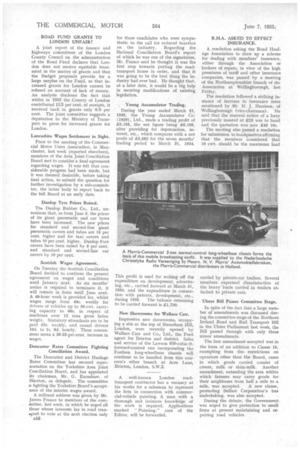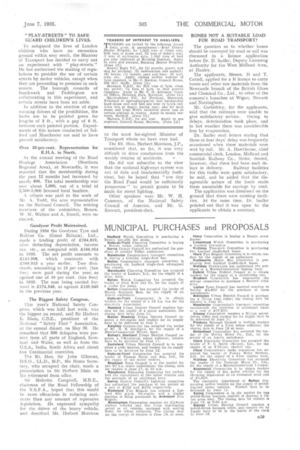ROAD FUND GRANTS TO LONDON UNFAIR?
Page 32

Page 33

If you've noticed an error in this article please click here to report it so we can fix it.
A joint report of the finance and highways committees of the London County Council on the administration of the Road Fund declares that London does not receive equitable treatment in the matter of grants and that the Budget proposals provide for a large surplus on the Fund, so that increased grants for London cannot be refused on account of lack of money. An analysis discloses the fact that whilst in 1933 the County of London contributed 13.5 per cent, of receipts, it received back in grants only 6.6 per cent, The joint committee suggests a deputation to the Ministry of Transport to press for increased grants for London.
Lancashire Wages Settlement in Sight.
Pnor to the meeting of the Commercial Motor Users Association, in Manchester, last week (reported, elsewhere), members of the Area Joint Conciliation Board met to consider a final agreement regarding wages. It was felt that considerable progress had been made, but it was deemed desirable, before taking final action, to submit the question for further investigation by a sub-committee, the latter body to report back to the full Board at an early date.
Dunlop Tyre Prices Raised.
The Dunlop Rubber Co., Ltd., annotfnces that, as from June 3, the prices of its giant pneumatic and car tyres have been increased. The new prices for standard and second-line giant pneumatic covers and tubes are 15 per cent, higher and for taxi covers and tubes 10 per cent. higher. Dunlop Fort covers have been raised by 5 per cent. and standard and second-line car covers by 10 per cent.
Scottish Wages Agreement.
On Tuesday the Scottish Conciliation Board decided to continue the present agreement on wages and conditions until January next. As six months' notice is required to terminate it, it will remain in force until June next. A 48-hour week is provided for, whilst wages range from 49s. weekly for drivers of vehicles up to 30-cwt. carrying capacity to 66s. in respect of machines over 12 tons gross laden weight. Statutory attendants are to be paid 52s. weekly, and casual drivers 10d. to ls. 9d. hourly. These concessions mean a 20-25-per-cent. increase in wages.
Doncaster Rates Committee Fighting Conciliation Award.
The Doncaster and District Haulage Rates Committee has secured representation on the Yorkshire Area Joint Conciliation Board, and has appointed its chairman, Mr. G. Earnshaw, of Blaxton, as delegate. The committee is fighting the Yorkshire Board's acceptance of the interim wages award.
A militant address was given by Mr. James France to members of the committee, last week, in which he urged all those whose interests lay in road tran',port to vote at the next election only
a18• for those candidates who were sympathetic to the call for reduced taxation on the industry. Regarding the National Conciliation Board's report of which he was one of the signatories, Mr. France said he thought it was the first step towards putting the roadtransport house in order, and that it was going to he the best thing the industry had ever had. He thought that, at a later date, it would be a big help in securing modifications of existing legislation.
Young Accumulator Trading.
During the year ended March 31, 1935, the Young Accumulator Co. (1929), Ltd., made a trading profit of £9,195, the net figure being £6,156, after providing for depreciation, interest, etc., which compares with a net profit of £5,682 for the seven months' trading period to March 31, 1934.
This profit is used for writing off the expenditure on development, advertising, etc., carried forward at March 31, 1934, and the expenditure in connection with patents, development, etc., during 1935. The balance remaining to be carried forward is £1,730.
New Showrooms for Wallace Carr.
Impressive new showrooms, occupying a site al the top of Streatham Hill, London, were recently opened by Wallace Carr and Co., Ltd., the Ford agent for Brixton and district. Sales and service of the Lawson 930-cubic-ft. forward-control van incorporating the Fordson long-wheelbase chassis will continue to be handled from this concern's other branch at Acre Lane, Brixton, London, S.W.2.
A well-known London roadtransport contractor has a vacancy at his works for a salesman to represent the firm in connection with commercial-vehicle painting. A man with a thorough and intimate knowledge of the work is required. Applications marked " Painting," care of the Editor, will be forwarded. R.H.A. ASKED TO EFFECT INSURANCE.
A resolution asking the Road Haulage Association to draw up a scheme for dealing with members' insurance, either through the Association or brokers of repute, in view of the high premiums of tariff and other insurance companies, was passed by a meeting of the Northamptonshire branch of the Association at Wellingborough, last Friday.
The resolution followed a striking instance of increase in insurance rates mentioned by Mr. 11. J. Harrison, of Wellingborough (vice-chairman). Ile said that the renewal notice of a lorry previously insured at £23 was to hand and the quotation was now £49 10s.
The meeting also passed a resolution for submission to headquarters affirming that the members considered that 10 cwt. should be the maximum load carried by private-car trailers. Several members expressed dissatisfaction at the heavy 'loads carried in trailers attached to private cars.
Ulster Bill Passes Committee Stage.
In spite of the fact that a large number of amendments was discussed during the committee stage of the Northern Ireland Road and Rail Transport Bill in the Ulster Parliament last week, the Bill passed through with only three minor amendments.
The first amendment accepted was in the form of an addition to Clause 15, exempting from the restrictions on operators other than the Board, cases in which goods carried consist of cream, milk or skim-milk. Another amendment, extending the area within which farmers may carry goods for their neighbours from half a mile to a mile, was accepted. A new clause, protecting Belfast Corporation's bus undertaking, was also accepted.
During the debate, the Government was urged to give protection to small. firms at present maintaining and repairing road vehicles. " PLAY-STREETS-" TO SAFE GUARD CHILDREN'S LIVES.
To safeguard the lives of London children who have no recreation ground within easy reach, the Minister of Transport has decided to carry out an experiment with " play-streets." Be has authorized the making of regulations to prohibit the use of certain streets by motor vehicles, except when they are proceeding to premises in such streets. The borough councils of Southwark and • Paddington are collaborating in this experiment, and certain streets have been set aside.
In addition to the erection of signs warning drivers of the prohibition, the kerbs are to be painted green for lengths of 3 ft., with a gap of 6 ft. between each painted portion. Experiments of this nature conducted at Salford and Manchester are said to have proved satisfactory.
Over 33-per-cent. Representation for R.H.A. in North.
At the annual meeting of the Road Haulage . Association (Northern Regional Area), at Newcastle, it was reported that the membership during the past 12 months had increased by nearly 400. The total membership was now about 1,000, out of a total of 2,500-3,000 licensed local hauliers.
A tribute was paid to the work of Mr. A. Todd, the area representative on the National Council. The retiring members of the coMmittee, Messrs. W. W. Walton and A. Ensoll, were reelected. ,
Goodyear Profit Maintained.
During 1934 the Goodyear Tyre and Rubber Co. (Great Britain), Ltd., made a trading profit of £164,810, after deducting depreciation, income tax, etc., as compared with £186,954 in 1933. The net profit amounts to £143,908, which contrasts with £109,913 a year earlier. Two dividends, amounting to 15 per cent. (tax free) were paid during the year, as against one of 10 per cent (tax free) in 1933. The sum being carried forward is £174,548, as against £150,640 in the previous year.
The Biggest Safety Congress. This year's National Safety Congress, which was held last week, was the biggest on record, said Sir Herbert E. Blain, C.B.E., president of the National " Safety First" Association,
at the annual dinner, on May 30. He remarked that 600 delegates were present from all parts of England, Scotland and Wales, as well! as from the U.S.A., India, South Africa and about five Continental countries.
The Rt. Hon. Sir John Gilmour, D.S.0.. LL.D., M.P., the Home Secretary, who occupied the chair, made a presentation to Sir Hebert Blain on his retirement from office.
Sir Malcolm Campbell, M.I3.E., chairman of the Road Fellowship of the N.S.F.A., hoped that this would be more efficacious in reducing accidents than any amount of repressive legislation. Ile expressed sympathy for the driver of the heavy vehicle, and described Mr. Herbert Morrison as the most far-sighted Minister of Transport whom we have ever had.
The Rt. Hon. Herbert Morrison, J.Pa considered that, so far, it was very difficult to draw conclusions from the weekly returns of accidents.
He did not subscribe to the view that the rta,tional highWays system. was out of date and fundamentally -inefficient, but he hoped that " one day the Road Fund would be sufficiently prosperous " to permit • grants to be
made for street lighting.
Other speakers were Mr. W: H. Cameron, of the National Safety Council of America, and Mr. G. Stewart, president-elect. BONES NOT A SUITABLE LOAD FOR ROAD TRANSPORT?
The question as to whether bones should be conveyed by road or rail was discussed in a licence application before Dr. D. Sadler, Deputy Licensing Authority for the West Midland Area, at Hanley.
The applicants, Messrs. D and T. Cattell, applied for a B licence to carry hones and other raw materials from the Newcastle branch of the British Glues and Chemical Co., Ltd., to other of the concern's branches at Wigan, Newark and Nottingham.
Mr. Corbishley, for the applicants, said that the railways were unable to give satisfactory service. Owing to delays, deterioration took place, and in hot weather there was considerable loss by evaporation.
Dr. Sadler read letters stating that three or four days' delay was frequently occasioned when these materials were sent by rail. Mr. A. Hawthorne, chief commercial clerk, London, Midland and Scottish Railway Co., Stoke, denied, however, that there had been such de lays in delivery. Railway facilities for this traffic were quite satisfactory, he said, and he added that the disagreeable nature of the loads made them unsuitable for carriage by road.
The application was dismissed on the ground that there were existing facilities. At the same time, Dr. Sadler pointed out that it was open to the applicants to obtain a contract.




























































































